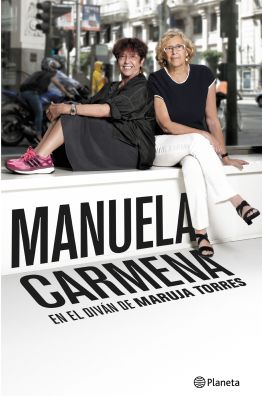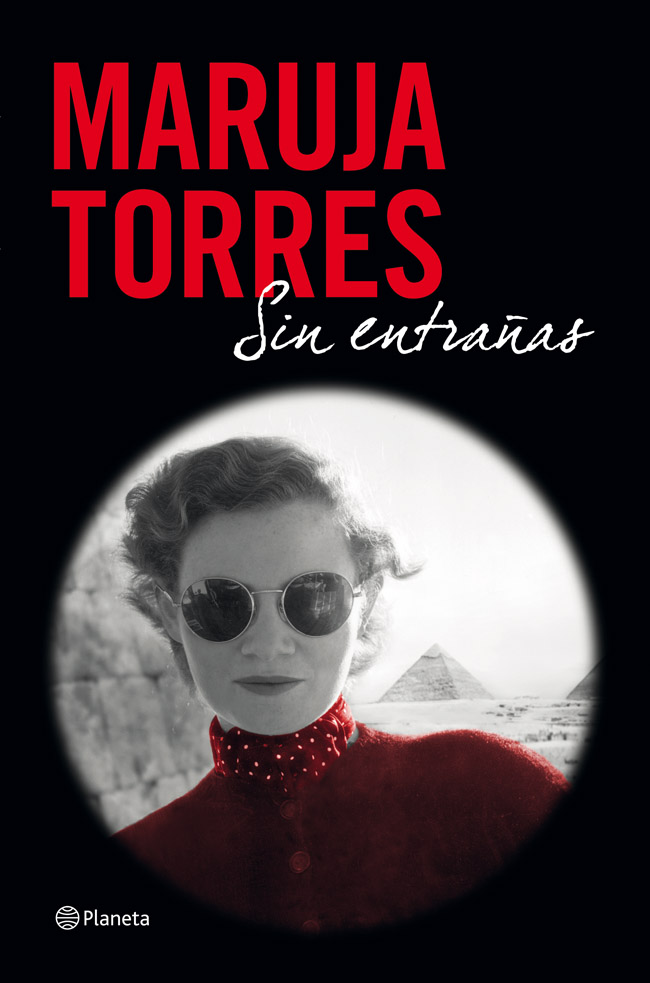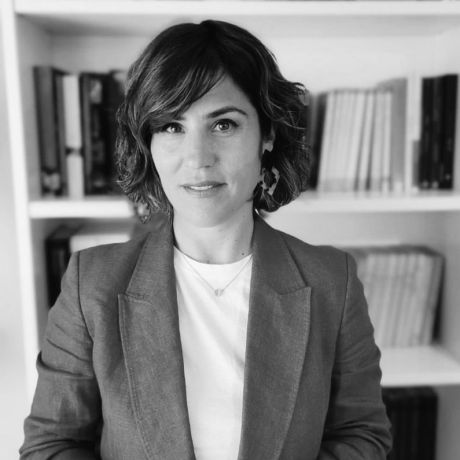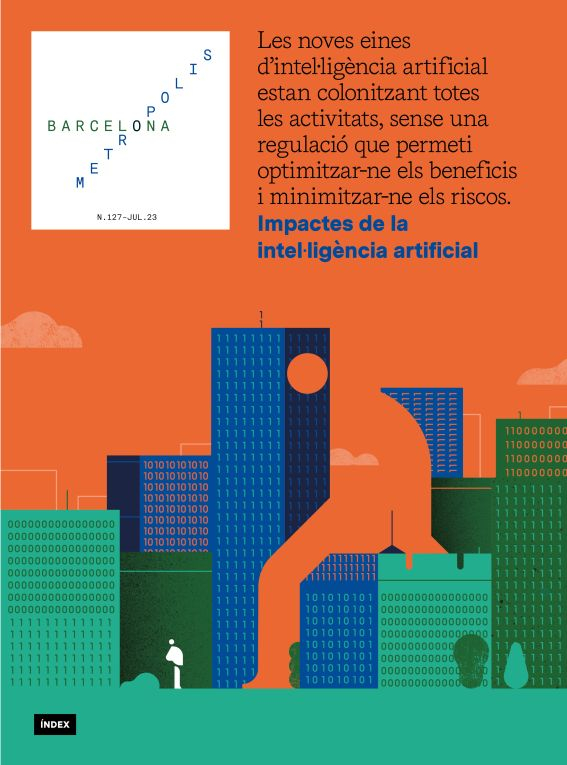“People who are confident make me wary of them”
- Interview
- Jul 23
- 21 mins
Maruja Torres
Maruja Torres arrives at our interview on foot with the aid (more mental than physical) of a wooden walking stick. She says that walking is good for her, and she counts her steps on a smart watch that she shows me. Maruja has been living in Madrid since 2018. She has dressed for the occasion, in fuchsia. “Young people don’t need colour; old people do,” she exclaims. She turned 80 this year and is still sharp-tongued and quick-thinking. She’s approached by a woman who recognises her and thanks her for her books, and whose husband doesn’t even stop to say hello. I offer to hold her walking stick while we take photographs for the interview. She declines. “I’m not hiding from anything, young lady!” She’s in the mood for a chat and we go to lunch. She goes for the Spanish potato salad (she’s a fan) and the ham croquettes (“the ones you can’t go wrong with”). She orders a glass of stout. “I look after myself to indulge in these pleasures”, she confesses. Maruja is still very much Maruja.
Maruja Torres Manzanera (Barcelona, 1943) is a writer and journalist. Self-taught, she has taken refuge in reading since she was a child. Raised in the Raval neighbourhood, the daughter of immigrants from Murcia, her father deserted the family when she was seven years old. In 1964, she made her debut in La Prensa and wrote for Garbo and Fotogramas, where she did her first reports and interviews. She was part of the founding team of the magazine Por Favor. In the early 1980s, she moved to Madrid and joined El País, first as a contributor and then as an editor and columnist. In 1984, she left the newspaper to join Cambio 16, but returned three years later to the Opinion section. Her columns became the newspaper’s trademark. In 2013, she resigned. She later wrote for Eldiario.es and Mongolia. She has been a war correspondent in Panama and Lebanon. Currently, she does a weekly commentary on the programme Hoy por Hoy on Cadena SER. She has written a dozen novels. In 2000, Mientras vivimos [As Long as We Live] earned her the Planeta Prize and, in 2009, Esperadme en el cielo [Wait for Me in Heaven] received the Nadal Prize. Torres has been awarded the Creu de Sant Jordi distinction.
You’ve turned 80. Quite a feat. How did you get this far?
I’m a very young old woman, and it is thanks to the wisdom that learning to grow old gives you. I believe that old age is like a staircase. When you have a health issue, you go down three or four steps. You think you’re going to die, but then the landing appears, and it’s not so bad on the landing! Not at first, because you’re afraid you’ll keep falling, but eventually you try to see how long it lasts. And then you fall anew... but there’s the landing again! This decade have caught me on a good landing. It’s not all plain sailing, but I can handle the jabs.
Looking back, are you satisfied that you’ve done what you set out to do?
It sounds really pedantic to say this, but I don’t think I have the right to grumble. My life had no prospects. Either I would follow the family’s advice and marry a man from the neighbourhood who wasn’t as miserable as we were, or I would wander around the streets of the Raval doing foolish things. But luck and serendipity struck me. Above all, the good fortune of being born with the desire to read. My mind needed stimulating, and that made me lead a “double life”: a life with friends and a disciplined life with my family. Because I had to protect the life I had outside the home, the longing to breathe, to be out and about and to learn, from the other life. My mother embroidered tablecloths for me for when I got married, imagine.
In this scenario you are describing, what future expectations might you have had?
At that time we all wanted to be writers and win awards. It was like the people who wanted to be bullfighters in Andalusia in the 1950s. We read everything, we talked and someone wrote articles. And we were nothing; we were nobody! But we met in a café or in the Círculo Excursionista, and that, at 14 or 15 years old, creates expectations of getting ahead.
But now you’re 80 and you still hold on to your expectations, the thrill of doing things…
Yes, but it is also true that everything physical changes. Desire changes. As you get older, you are more settled, you are more realistic and you know that there is not much time left on the clock. But there are certain things that don’t change for me. A year and a half ago, when I did my first column for Àngels Barceló on Cadena SER, I had the same feeling of anxiety as I did when I started writing. Whenever I do something new I feel like I am doing it for the first time.
What do you feel?
Fear. Stage fright. Fear of doing it badly. Insecurity. And that’s a good thing. People who are confident make me wary. It’s very good to be insecure and to revise thoroughly.
Are you describing the impostor syndrome that women sometimes suffer from?
In my case, I don’t think that’s what it is. My syndrome is that of the red-light-district impostor, this one is brilliant (she laughs). But I don’t have an education; I don’t even have the secondary education completion qualification, my girl!
“My syndrome is that of the red-light-district impostor, this one is brilliant. But I don’t have an education.”
Has changing decade prompted you to reflect on the passage of time in particular or do you prefer to relativise it?
This is a very interesting topic and I have been assimilating it. Since I was 73 or 74, I’ve appreciated the passing of time. Because I need to feel that time is passing nicely, to feel it on my skin, so that when I die I won’t have been bored for a single minute. I have never been bored in my life, only when I was an office worker. But who doesn’t get bored doing mundane jobs!
Has time made you a more selective person?
Absolutely. I can be nice, but I shy away when I see that my selection doesn’t suit that moment or that person. I am very sociable with the people I like. I’ve always been a person who loves sitting around chatting after a meal, but even more so now. Those of my generation never got tired of talking. And now I enjoy it anew because I still have contemporaries and other young but mature friends with whom I can talk, take an interest and keep up to date. I’m not particularly nostalgic, but I like being with people to whom I don’t have to explain things, because we’ve shared them…
Needless to say, when you’re 80 years old, you’ve already lost friends…
Lots of them, friends who were reference points for me. Montserrat Roig was the first. She was the big surprise. But also many of us who used to go to the Sot bar [on Barcelona’s Carrer de la Diputació].
How do you live with it?
You get used to it. When you are young you cry an awful lot. And you don’t realise that the void they have left will last for a long time. Because they have played a part in your education and they have been instrumental. From the age of 14 to 25 they were telling you that we had to better the world. That was our goal: to improve society and to do so together. I learned this from Marina Curià and Montse Roig. And I’m still here! They weren’t exclusive. They didn’t even know what that meant. Anyone who was anti-Franco was welcome.
Are you trying to fill the gap with younger people?
That’s my luck! Suddenly a fellow comes along, Edu Galán [Mongolia magazine], who has gerontophilia and is very good at bringing people together. When I decided to settle in Madrid he helped me with the flat, he’s kind and practical. And he knows a lot of people I’m interested in.
What interests you in a person?
It’s hard to define, but they have to be a real person. I don’t need them to think or be the same as me, but I do need them to be real. I don’t want to waste my time with facades. I don’t want them to be told I am right, but to be given reasons…
Does fear become more pronounced with age?
Above all, the fear of travelling. My skeleton is a mess, I get dizzy and that makes me insecure when travelling alone. But I’m overcoming it thanks to Jordi Évole, who delightfully accompanied me to Rome. Now I know it’s a silly fear, an old woman’s fear, it’s contrived. There are two kinds of old age: the one imposed on you and the one you are. And you have to hold on to the one you are. Because I know I can travel with assistance on trains and planes. In fact, I already have more trips planned. And if I have a turn in Brussels airport, then it’s better than having one at home. Long live Manolo [Vázquez Montalbán], who died in Bangkok after a hell of a trip!
What is your day-to-day life like; do you lead a quiet life?
An old lady needs a number of things (she laughs). I get up early and turn on the radio, because I like to be informed. I wash the evening dishes and make breakfast, a ritual. I’m so excited about eating bread! It was the big no-no of my generation because they wanted us to be thin. I make three coffees for myself and then I exercise while reading the papers. And then comes my social life, but a moderate social life. I spend my evenings on the sofa, reading or watching series.
Wow, so you take care of yourself.
I take care of myself to give myself a good life. I’m not stoic. I’m epicurean as hell!
“I felt that life in Barcelona had become very unpleasant back in 2017, because I hadn’t been called a xarnega in a long time.”
You moved to Madrid some time ago. Why did you decide to leave Barcelona?
I felt that life in Barcelona had become very unpleasant back in 2017, because I hadn’t been called a xarnega [term, often derogatory, used to refer to economic migrants to Catalonia from another regions of Spain] in a long time. And ordinary people were calling me that, and gave me dirty looks. And some people didn’t even dare to look at me. What can I say, this is not my Barcelona. Just as Beirut is no longer my Beirut. Funnily enough, both cities were full of flags and political leaders. And now Madrid is almost as foul.
Because of the flags or because of the politicians?
I have developed a killer instinct not to see flags; I blot them out, whatever they are. Conversely, I have developed the instinct to notice the people I’m interested in. But Madrid is colourful and free, and it will resist everything. It withstood Franco to the end and, now that we have this shitty history in the Community [of Madrid] and in the City Council, it will resist too.
What does Madrid offer you?
Here they don’t ask you where you come from. I don’t ask either. It’s a really unpleasant obligation to have to do so. I did it in Lebanon, always wondering whether someone was a Sunni Muslim or an Orthodox Christian. What a chore!
But Madrid doesn’t have a sea…
It’s true that I long for the sea. But the last time I went to the sea in Barcelona it smelled so much of shrimp and coconut oil that you had to go further than the Hotel Arts to avoid the stench. But then there was only a bunch of snobs there.
Do you rule out going back to live in Barcelona?
Yes, I’ve seen and experienced it all. And, most of all, because of the lack of living friends. In Barcelona I’d get bored. I come from a nomadic family, people who came to Barcelona to work at the Universal Exposition. People who went where they were given work. I’ve spent my life doing that, going where they gave me work. Now I really want to go to Asturias. I go there every year and I’m very much drawn to it. I love Asturias, it’s beautiful and they have a very cheeky sense of humour. They love the good life.
 Portrait of Maruja Torres. © Javier Barbancho
Portrait of Maruja Torres. © Javier BarbanchoIf you think of “your” Barcelona, what image or smell takes you back to it?
It’s tricky because it varies. There was one smell for Sundays and another for every other day. Sundays smelled of salt. I used to go to Sant Miquel beach, where there was a section for women only. The men climbed over the fence like monkeys because some of us went topless in the 1950s. I was 15 or 16 then. It was salt; it was the smell of the sea. And then, house parties. I also remember the shade of the plane trees on La Rambla, the sun shining through the leaves. And the freshly sprinkled pavement on La Rambla.
But now it’s under construction...
I don’t even want to know! Tourism drove me out of La Rambla. I remember a few years ago, back in 2012, walking up it with a group of students I wanted to take to Boadas for a cocktail, silly me. And doing so surrounded by people in shorts and sandals, thighs jiggling and rubbing against each other. I have experienced many different Ramblas: the one where you went to feed the pigeons and paid one peseta for a chair; the one where the first Americans brought whores; the Liceu seen from the pavement opposite, the one for the poor; and then the one for young people and democracy. But that day I only saw a flood of strange people.
Are you one of those people who believe that tourism has ruined Barcelona?
I don’t think so, because Barcelona is very much Barcelona. It is an era. Another thing is that tourism is destroying everything. Not even God lives in the centre of Rome. But it will pass... I’m in favour of tourism becoming more democratic, but we have to accept that more people are travelling, and we all want to take a selfie wherever we can.
Your profession has allowed you to travel a lot. Is that what it has most given you?
Yes, clearly, above all, seeing the world and meeting people.
What about recognition?
It is very important, but the recognition of a job well done. Not fame for fame’s sake, because it’s fleeting. I’m lucky that I started in journalism late and it took me a while to make a name for myself. And you’re not as much of a moron as you were when you were 20.
Your columns in El País and your reports have had an impact on society, albeit late. Did this generate too much responsibility for you?
I didn’t think about it, but the person who hired me told me in my ear: “Remember we have 1.5 million readers”. The media put the pressure on you. El País was the big newspaper at the time. I wasn’t aware of that responsibility, I preferred not to think about it and to write what I felt in my gut, but thinking it through.
“When someone tells me that they became a journalist because of me, I think I should apologise to them. Because, they would have been better off becoming an electrician.”
So many of us ran to read you. You have marked generations of journalists, don’t you think?
Sometimes, when someone tells me that they became a journalist because of me, I think I should apologise to them. Because, they would have been better off becoming an electrician. Today’s journalism is screwed up.
There is a shortage of hands in the newsroom and remote work is gaining ground. Can you produce good journalism from home?
You can be a good “gap filler”. You can become a good journalist if what you do is talk about your home, your family history or that your mother is a murderer who lives in the next room…
You are self-taught. Do you think you need to have a university degree to be a journalist?
I just don’t trust teachers; the good ones are dead. The best school is a good journalist taking a student to shadow them and learn. And everything else is just a way to get money out of young people to see if they have a chance of landing a permanent job.
Are you afraid of artificial intelligence tools, like ChatGPT, which write texts as if they were people?
I’m not afraid of anything any more – I’ve tried it, you know! I asked it which English author was the best poet during colonialism. And it said it didn’t know. It was Rudyard Kipling; it was easy! It is inevitable that these tools will get in. There is nothing worse than laziness.
You are very active on Twitter, a social network that is not very conducive to reflection.
I use it because I’m very good at captioning (laughs) and little else. I don’t listen to haters, nor do I read them. Occasionally I block someone because I can’t be bothered, because they’re a fanatic or a moron.
I think you’ve already said “moron” two or three times in this interview…
I just think it’s a great word.
Do you miss writing for others?
I write with my head, I take notes… Maybe one day I’ll publish again, because life is long and it takes lots of turns.
Have you received any proposals?
A whole host of them! And all about the same thing: old age. It’s unbearable! I’d like to write about other things, I don’t plan to write self-help books for old people. Any good book is helpful, if you get rid of the self in front of it.
When you won the Planeta prize in 2000, your friend Terenci Moix wrote in El País that your writing is characterised by “a nasty character accumulated in outrage at the stupidity of life”. Was he right?
Terenci loved me… (she bursts out laughing). But yes, of course I see my reflection! Terenci was very funny because he used to say to me: “Oh, girl, all those countries you go to, all those things you do…”
 Portrait of Maruja Torres. © Javier Barbancho
Portrait of Maruja Torres. © Javier BarbanchoYou often say that you write the way you talk, which is a great piece of advice you were given. Do you think there is too much paraphernalia in literature?
Elisenda Nadal gave me that advice. I understand so little by literature; I don’t even consider myself literary. When people ask me what they can read of my work, I tell them that if they can read Paul Auster, don’t read me, because time is short. I see myself as a person who knows how to storytell. For me books have been an adventure, just another one. But my craft, my profession, is that of a reporter. I don’t even consider myself a columnist. When I dream, I’m reporting, but of course, my body doesn’t keep up with me…
Must you have a certain recklessness to be a good reporter?
You must have the thoughtlessness of youth, but all the maturity of bearing witness; you have be very responsible for what you say. You have the immense good fortune to watch history unfold before your eyes. You can’t start rehashing or writing without leaving your hotel.
And what role does the ego play here?
There is too much individualism and a lack of collective eagerness to improve life. But I think we are better off than in the 1980s, when there was an antiquated male chauvinism.
But there is still male chauvinism!
It’ll never go away, my girl! Do you think men will let you take what they have? You’re so wrong. At most, what they’ll do is acknowledge it.
When you were writing opinion pieces, did people look down on you for being a woman?
No, but I always had to hear the line “you know what Maruja is like”. It is the product of condescension. And what I never liked was to be “sponsored”…
And when you were covering war?
Women need to be as shrewd as snakes and as innocent as doves. I was good at being a woman in chauvinistic worlds and being a moron, it worked. I got stories because men pretended I wasn’t there, and I accepted that. But then I would write down everything I had seen and heard. I had to prove I was brave, so they accepted me. Also because I wasn’t pretty.
How do you experience the changes in your body?
Since I got older, better. I was part of a first generation that experienced the rise of anorexia. Models weighed 40 kilos and came from London. Men began to believe that they had the right to women weighing 50 kilos and not 70. I was chubby because I came from a poor family and we mostly ate carbs. It was the time of the Barcelona School; there was a strong obsession with image. I wanted to have boyfriends and have sex, and for that I had to be slim. Now I am more comfortable with my body than when I was young.
You were born during Franco’s dictatorship. Would you ever have imagined that the extreme right could have 52 deputies in Congress?
The problem today is that there is extremism, but on a global scale. That’s the way it is. History is a seesaw. Finland is screwed, Northern European countries in general. Trumpism is the synthesis that is the focus of this hatred. They are the ill-mannered of the world put together, they are uneducated, disrespectful people who believe they deserve everything and that they have no obligations. They prefer quarrelling to conversation.
“Social democracy has become mediocre. It has failed to read the signs of the outraged illiterate.”
Is the left partly to blame?
Democracy in general. Social democracy has become mediocre. It has failed to read the signs of the outraged illiterate. And I know it’s not easy… But I’ve gotten older and I no longer want to wage a revolution. I want to bring about evolution. I don’t want to be prevented from evolving.
And, meanwhile, society withstands a build-up of problems…
I am so old that it worries me that there is no backlash against injustice and that, if there is, it is disorganised and sloppy. They have been pissing on us for a long time. And I worry about individualism without a social purpose. Personal happiness is one thing and social happiness is another; and what is missing is people striving for collective happiness. I have a perfectly secure future. With a reasonable amount of contentment, without causing offence to anyone. What I like is the happiness of belonging to a world that progresses because it aspires to. But I have little confidence in the human race.
You don’t have children. Do you worry about not having someone to look after you?
I decided not to have children many years ago, when it was harder than it is now. I thought that not having someone to look after me didn’t matter to me. Because I didn’t want a life I didn’t like. My mother had a stroke when she was 72 and lived for another 15 years. I took care of everything, but I still kept up my career. After the stroke, one day she said something terrible to me: “How lovely, daughter; now at last we’ll always be together”. I told myself that I was lucky not to have children and that I would never be like that. I have no maternal instinct, no filial instinct, in that way…
You’ve got some great test results. The all-clear to keep on enjoying life?
We’ll see how the next ones go… but I hope so. And when things don’t go well, I’d like to have free rein to end things quickly. I like the life I lead. I’m really hedonistic. If I have to go down a couple of steps, I go down them. But the day there’s no landing, I’ll raise a toast to everything I’ve had, which is a lot. I support euthanasia and assisted suicide. If I had a pill that didn’t expire and was effective, I’d keep it in my drawer for the moment when I thought: “This is as far as we’ve come”.
But in the meantime, don’t take a good stout or a shot of whiskey away from me…
I like to enjoy drinking and eating, the two things together. The women in American movies who come home and pour themselves a glass of wine are depressed, have shitty marriages and stressful jobs. You have to know what to drink and what to eat. If they give me Peppermint [schnapps], I become the biggest teetotaller in the world.
Are you a supporter of optimism?
I am a fierce realist, in other words, a pessimist, but that’s why it’s worth trying and enjoying whatever is ahead. You read the history of mankind and, if only for antibiotics, life is worth living! Or for knee replacements, this is the business.
I envy you...
Don’t: learn! Take good care of your body, but enjoy life and be grateful for what you have. Enough woes! I don’t like to moan, I prefer being cheerful.
That makes life longer!
It has to make it longer, otherwise it would be really unfair. Look at me, I should have died at 70, or in the wars, and I’m already in my 80s!
Recommended posts
 Manuela Carmena en el diván de Maruja TorresPlaneta, 2015.
Manuela Carmena en el diván de Maruja TorresPlaneta, 2015. Diez veces sietePlaneta, 2014
Diez veces sietePlaneta, 2014 Sin entrañasPlaneta, 2012
Sin entrañasPlaneta, 2012
The newsletter
Subscribe to our newsletter to keep up to date with Barcelona Metròpolis' new developments




